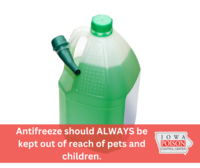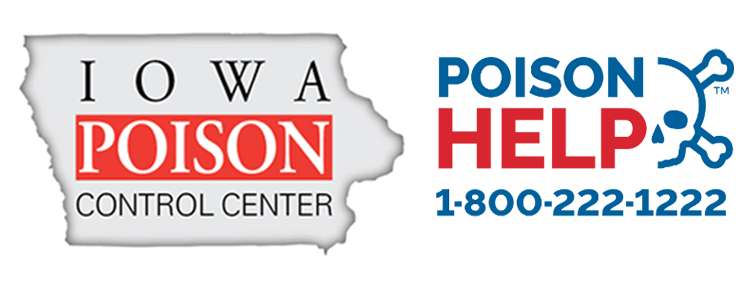
For Poisoning Questions or Emergencies, Call the Poison Experts at 1-800-222-1222
Antifreeze: A Winter Essential with Hidden Dangers

Winter brings with it the joy of snowball fights, the beauty of frosty landscapes and the warmth of cozy firesides. But it also brings the risk of freezing temperatures that can spell trouble for our vehicles. To combat this, many of us turn to antifreeze, a critical tool in our winter arsenal. But while antifreeze plays an essential role in keeping our cars functioning throughout the frosty winter months, it also carries hidden dangers that every car owner should be aware of.
At the Iowa Poison Control Center, we're committed to helping you navigate those dangers. Our team of poison specialists is available around the clock to provide expert information and guidance on a variety of potential poisonings, including those related to antifreeze. In this blog post, we'll delve into the risks associated with antifreeze, provide tips on how to prevent accidental poisonings and explain how our poison specialists are here to help you with any questions or emergencies you may have.
Antifreeze: A Winter Lifesaver with a Toxic Twist
Antifreeze, typically used in car radiators, is a liquid solution that lowers the freezing point of the water that cools your engine. By doing so, it prevents your engine from freezing or overheating, depending on the season. Sounds like a winter lifesaver, right? Well, it is, but it comes with a toxic twist.
Antifreeze typically includes ethylene glycol, a substance known for its excellent freeze prevention properties, yet it is also extremely toxic. Its sweetness poses a significant risk as it may attract children and pets. Antifreeze comes in multiple forms, and while ethylene glycol is common, some varieties may have other harmful ingredients. Therefore, it's crucial to contact the Iowa Poison Control Center, ideally with the product's container at hand for reference, so the most accurate information and recommendations can be provided.
The Hidden Dangers of Antifreeze
When ingested, ethylene glycol can cause a variety of severe and potentially lethal health issues, including kidney failure and central nervous system damage. Even small quantities can be harmful, which makes any accidental spill or improper storage a potential hazard.
According to the 2022 National Poison Data System (NPDS) Annual Report, there were 6,597 cases of antifreeze poisonings nationwide. This figure highlights the importance of awareness and preventive measures to ensure the safety of everyone, especially the most vulnerable members of our households.
Prevention is Better than Cure
The good news is that antifreeze poisonings are preventable. Here's how you can protect your family and pets:
- Store Safely: Always store antifreeze out of reach of children and pets. If possible, keep it in a locked cabinet.
- Clean Up Immediately: If you spill antifreeze, clean it up straight away. Remember, it's not just large spills that are dangerous - even a small quantity can be harmful.
- Dispose of Responsibly: Never pour leftover antifreeze down the drain or onto the ground. It's essential to dispose of it responsibly.
- Opt for a Safer Alternative: Some brands of antifreeze contain a bittering agent to make it less appealing to children and pets. While not foolproof, it can provide an extra layer of safety.
Your Lifeline: The Poison Specialists at the Iowa Poison Control Center
In the event of a potential poisoning, remember that you're not alone. Our poison specialists at the Iowa Poison Control Center are your lifeline. Available 24/7, they're ready and equipped to provide expert advice and guidance.
When you call, you'll be connected to a specially trained nurse, pharmacist or physician who will guide you through the necessary steps to manage the situation. In 2022 alone, we managed more than 23,000 cases, helping Iowans navigate through potential poisoning incidents. With an average of 15 years of experience, our poison specialists have the knowledge and skills to handle a wide range of poisoning situations, including those involving antifreeze.
Antifreeze is undoubtedly a vital tool for winter vehicle maintenance. However, it's crucial to be aware of the potential dangers it poses and to take the necessary precautions to avoid accidental poisonings. And remember, if you ever have any concerns or questions about antifreeze or any other potential poisoning, don't hesitate to reach out to us at the Iowa Poison Control Center - we're always here to help. Stay safe this winter.
